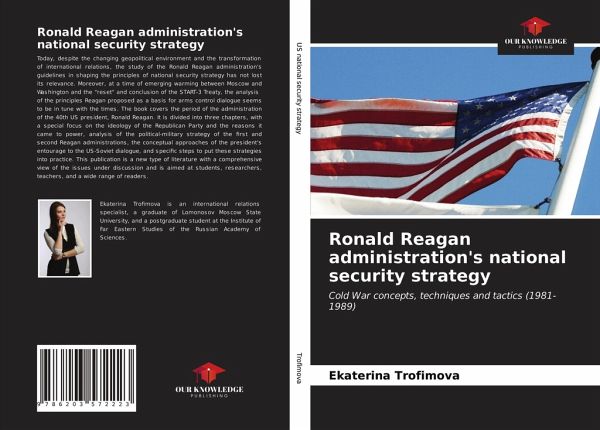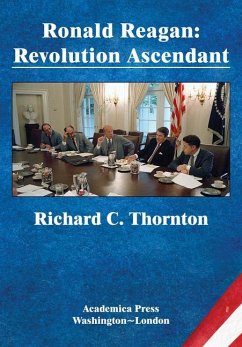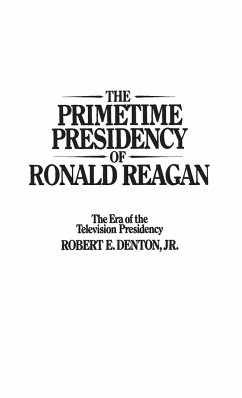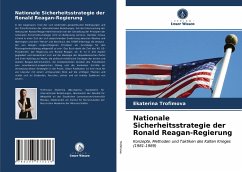
Ronald Reagan administration's national security strategy
Cold War concepts, techniques and tactics (1981-1989)
Versandkostenfrei!
Versandfertig in 6-10 Tagen
45,99 €
inkl. MwSt.

PAYBACK Punkte
23 °P sammeln!
Today, despite the changing geopolitical environment and the transformation of international relations, the study of the Ronald Reagan administration's guidelines in shaping the principles of national security strategy has not lost its relevance. Moreover, at a time of emerging warming between Moscow and Washington and the "reset" and conclusion of the START-3 Treaty, the analysis of the principles Reagan proposed as a basis for arms control dialogue seems to be in tune with the times. The book covers the period of the administration of the 40th US president, Ronald Reagan. It is divided into ...
Today, despite the changing geopolitical environment and the transformation of international relations, the study of the Ronald Reagan administration's guidelines in shaping the principles of national security strategy has not lost its relevance. Moreover, at a time of emerging warming between Moscow and Washington and the "reset" and conclusion of the START-3 Treaty, the analysis of the principles Reagan proposed as a basis for arms control dialogue seems to be in tune with the times. The book covers the period of the administration of the 40th US president, Ronald Reagan. It is divided into three chapters, with a special focus on the ideology of the Republican Party and the reasons it came to power, analysis of the political-military strategy of the first and second Reagan administrations, the conceptual approaches of the president's entourage to the US-Soviet dialogue, and specific steps to put these strategies into practice. This publication is a new type of literature with acomprehensive view of the issues under discussion and is aimed at students, researchers, teachers, and a wide range of readers.
Today, despite the changing geopolitical environment and the transformation of international relations, the study of the Ronald Reagan administration's guidelines in shaping the principles of national security strategy has not lost its relevance. Moreover, at a time of emerging warming between Moscow and Washington and the "reset" and conclusion of the START-3 Treaty, the analysis of the principles Reagan proposed as a basis for arms control dialogue seems to be in tune with the times. The book covers the period of the administration of the 40th US president, Ronald Reagan. It is divided into three chapters, with a special focus on the ideology of the Republican Party and the reasons it came to power, analysis of the political-military strategy of the first and second Reagan administrations, the conceptual approaches of the president's entourage to the US-Soviet dialogue, and specific steps to put these strategies into practice. This publication is a new type of literature with a comprehensive view of the issues under discussion and is aimed at students, researchers, teachers, and a wide range of readers.
Today, despite the changing geopolitical environment and the transformation of international relations, the study of the Ronald Reagan administration's guidelines in shaping the principles of national security strategy has not lost its relevance. Moreover, at a time of emerging warming between Moscow and Washington and the "reset" and conclusion of the START-3 Treaty, the analysis of the principles Reagan proposed as a basis for arms control dialogue seems to be in tune with the times. The book covers the period of the administration of the 40th US president, Ronald Reagan. It is divided into three chapters, with a special focus on the ideology of the Republican Party and the reasons it came to power, analysis of the political-military strategy of the first and second Reagan administrations, the conceptual approaches of the president's entourage to the US-Soviet dialogue, and specific steps to put these strategies into practice. This publication is a new type of literature with a comprehensive view of the issues under discussion and is aimed at students, researchers, teachers, and a wide range of readers.












